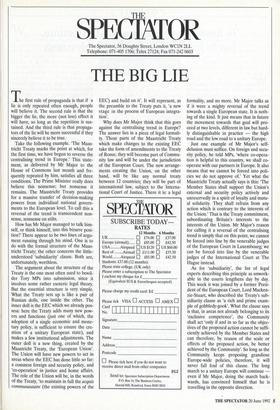SPECTAT THE OR
The Spectator, 56 Doughty Street, London WC1N 2LL Telephone: 071-405 1706; Telex 27124; Fax 071-242 0603
THE BIG LIE
The first rule of propaganda is that if a lie is only repeated often enough, people will believe it. The second rule is that the bigger the lie, the more (not less) effect it will have, so long as the repetition is sus- tained. And the third rule is that propaga- tors of the lie will be more successful if they sincerely believe it to be true.
Take the following example. 'The Maas- tricht Treaty marks the point at which, for the first time, we have begun to reverse the centralising trend in Europe.' This state- ment, as delivered by Mr Major to the House of Commons last month and fre- quently repeated by him, satisfies all three conditions. The Prime Minister really does believe this nonsense; but nonsense it remains. The Maastricht Treaty provides for a massive transfer of decision-making powers from individival national govern- ments to the European level. To call this a reversal of the trend is transcendent non- sense, nonsense on stilts.
How has Mr Major managed to talk him- self, or think himself, into this bizarre posi- tion? There appear to be two lines of argu- ment running through his mind. One is to do with the formal structure of the Maas- tricht Treaty; the other concerns the little- understood `subsidiarity' clause. Both are, unfortunately, worthless.
The argument about the structure of the Treaty is the one most often used to bewil- der Tory MPs into submission, since it involves some rather esoteric legal theory. But the essential structure is very simple. What the Treaty sets up is like a pair of Russian dolls, one inside the other. The inner doll is the EEC which we already pos- sess: here the Treaty adds many new pow- ers and functions (just one of which, the adoption of a single economic and mone- tary policy, is sufficient to ensure the cre- ation of a unitary European state), and makes a few institutional adjustments. The outer doll is a new thing, created by the Maastricht Treaty, the 'European Union'. The Union will have new powers to act in areas where the EEC has done little so far: a common foreign and security policy, and 'co-operation' in justice and home affairs. The role of the Union will be, in the words of the Treaty, 'to maintain in full the acquis communautaire (the existing powers of the
EEC) and build on it'. It will represent, as the preamble to the Treaty puts it, 'a new stage in the process of European integra- tion'.
Why does Mr Major think that this goes against the centralising trend in Europe? The answer lies in a piece of legal formali- ty. Those parts of the Maastricht Treaty which make changes to the existing EEC take the form of amendments to the Treaty of Rome; they will become part of Commu- nity law and will be under the jurisdiction of the European Court. The new arrange- ments creating the Union, on the other hand, will be like any normal treaty between 12 countries; they will be part of *nternational law, subject to the Interna- tional Court of Justice. There it is: a legal
formality, and no more. Mr Major talks as if it were a mighty reversal of the trend towards a single European state. It is noth- ing of the kind. It just means that in future the movement towards that goal will pro- ceed at two levels, different in law but hard- ly distinguishable in practice — the high road and the low road to a unitary Europe.
Just one example of Mr Major's self- delusion must suffice. On foreign and secu- rity policy, he told MPs, 'where co-opera- tion is helpful to this country, we shall co- operate with our partners in Europe. It also means that we cannot be forced into poli- cies we do not approve of.' Yet what the Maastricht Treaty actually says is this: 'The Member States shall support the Union's external and security policy actively and unreservedly in a spirit of loyalty and mutu- al solidarity. They shall refrain from any action which is contrary to the interests of the Union.' That is the Treaty commitment, subordinating Britain's interests to the interests of the Union. Mr Major's reason for calling it a reversal of the centralising trend is simply that on this point, we cannot be forced into line by the venerable judges of the European Court in Luxembourg; we can be forced into line by the venerable judges of the International Court at The Hague instead.
As for `subsidiarity', the list of legal experts describing this principle as unwork- able in the courts lengthens day by day. This week it was joined by a former Presi- dent of the European Court, Lord Macken- zie-Stuart, who described the Treaty's sub- sidiarity clause as 'a rich and prime exam- ple of gobbledy-gook'. What the clause says is that, in areas not already belonging to its 'exclusive competence', the Community shall act 'only if and in so far as the objec- tives of the proposed action cannot be suffi- ciently achieved by the Member States and can therefore, by reason of the scale or effects of the proposed action, be better achieved by the Community'. So long as the Community keeps proposing grandiose Europe-wide policies, therefore, it will never fall foul of this clause. The long march to a unitary Europe will continue — even if Mr Major, doing the march back- wards, has convinced himself that he is travelling in the opposite direction.


























































 Previous page
Previous page